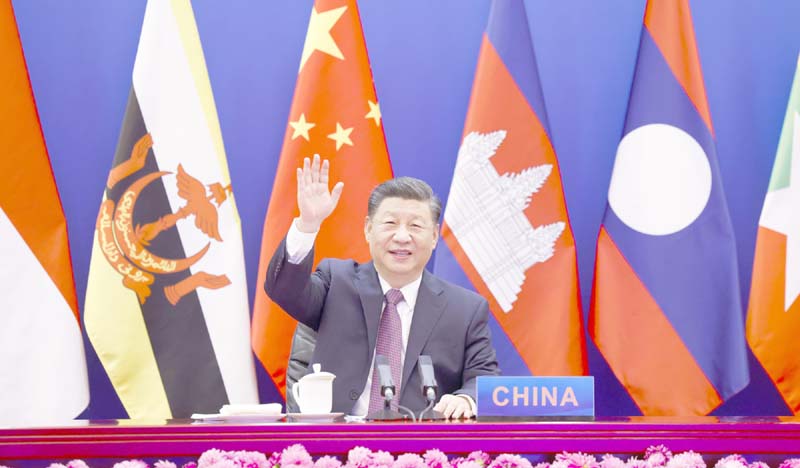President Xi Jinping told Asean leaders that Beijing is willing to sign protocol to the treaty ‘as early as possible’
It has indicated it will do so for more than two decades, and observers say the security alliance could speed up the process
By Amber Wang
China has voiced support for a nuclear weapon-free zone in Southeast Asia as it seeks to strengthen regional alliances, pushed by concerns over the new Aukus security pact, according to observers. While Beijing has yet to sign the protocol to the Asean treaty to keep nuclear weapons out of the region despite indicating a willingness to do so for more than two decades pressure from the new partnership between Australia, the UK and the US could speed up the process, they said.
President Xi Jinping told Association of Southeast Asian Nations leaders on Monday that China backed efforts to build a nuclear weapon-free zone and was willing to sign the protocol to the treaty “as early as possible”. He also pledged at the virtual summit to upgrade relations with Asean to focus more on security cooperation and development funding. Signed by Asean members in 1995, the Treaty of Southeast Asia Nuclear Weapon-Free Zone (SEANWFZ) is a commitment to keep the region free of nuclear and other weapons of mass destruction.
Beijing indicated it was willing to sign the protocol to the treaty within years, but as yet, none of the five legal nuclear powers China, the US, Russia, Britain and France have signed up. Under the protocol, they would be obliged not to develop, manufacture or possess nuclear weapons, or to receive any assistance to do so. With tensions mounting in the region particularly between Beijing and Washington in the South China Sea and the Taiwan Strait Asean members want the protocol signed, according to Dai Fan, director of the Centre for Philippine Studies at Jinan University in Guangzhou.
“As China-US rivalry grows, the US is strengthening its security alliances, including through Aukus, which poses a threat to regional peace and stability,” Dai said. He noted that Indonesia and Malaysia had both come out strongly against Australia’s acquisition of nuclear-powere submarines under the pact, and that their stance was “consistent with China’s position”. Dai said Beijing was seeking to ease tensions and “contain Aukus” by promoting the nuclear weapon-free zone.
In September, Chinese Foreign Minister Wang Yi told his Malaysian and Bruneian counterparts that the Aukus partnership and its nuclear submarine plans could sabotage the establishment of a nuclear-free zone in Southeast Asia. “The United States and Britain chose not to participate in the SEANWFZ Treaty. Instead, they have transferred military nuclear technology to the region under various pretexts and also provided the region with highly enriched uranium materials, running counter to the efforts made by Asean countries to build a nuclear-free zone,” Wang said in the meeting.
Asean members continue to engage with nuclear-weapon states over the treaty and are seeking to resolve the outstanding issues, according to the joint communique from a foreign ministers’ meeting in August. Zhao Tong, a senior fellow with the nuclear policy programme at the Carnegie-Tsinghua Centre for Global Policy in Beijing, said China’s focus had shifted to regional ties and it was less concerned about solidarity with the other nuclear powers given the antagonism with the US.
“China has no substantive suggestions on the protocol from a technical perspective. But other nuclear-weapon states, including the US, still have concerns and worry that the protocol will restrict the deployment of their nuclear-weapon platforms,” he said. “Showing support for the protocol is also a way to build closer relations with Asean.”


